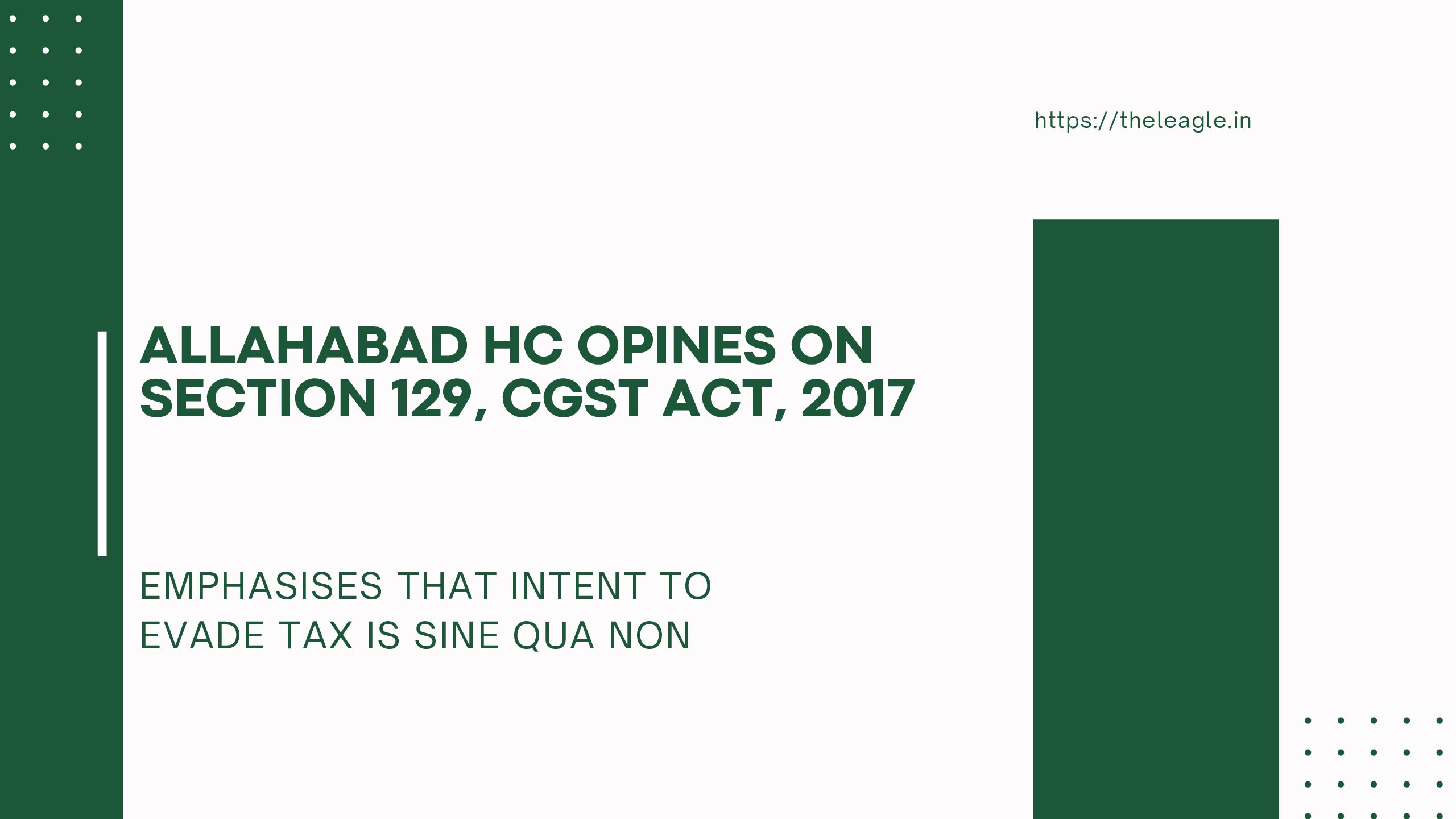In a recent case[1], the Allahabad High Court has reiterated an essential condition to invoke Section 129, CGST Act, 2017, i.e., an intention to evade tax. While a similar observation has been made by Supreme Court in M/s Satyam Shivam Papers case[2], the High Court’s reinforcement is perhaps necessary due to repeated transgressions by the Revenue Department.
Facts
In the impugned case, the petitioner was engaged in the business of manufacture and sale of industrial grade steel components such as channels, beams, etc. The petitioner was transporting the said goods to M/s Maa Ambey Steels with the relevant tax invoices, e-way bills, etc. During transport, the said goods were intercepted, and the relevant officers found that the e-way bill accompanying the goods had been cancelled by the purchaser, M/s Maa Ambey Steels. In the absence of a valid e-way bills, the goods were seized. The petitioner subsequently explained to the Revenue Department that all the relevant e-way bills had been completed but the it was unaware of the fact that e-way bills had been cancelled by the purchaser. The petitioner tried to convince the Revenue Department that the transaction in question was genuine and goods were being sold by a registered dealer to another registered dealer. Dissatisfied with the petitioner’s response, the Revenue Department passed an order under Section 129(3), CGST Act, 2017 and a penalty was imposed on the petitioner. The petitioner assailed the said order via writ petition before the Allahabad High Court.
No Intention to Evade Tax
The Allahabad High Court engaged with the arguments of the petitioner and the Revenue Department. The petitioner’s primary argument was that while an order was passed against it under Section 129 whereby a penalty imposed, but in the said order there was no reference to the petitioner’s intention to evade tax. The petitioner argued that in the absence of an intent to evade tax, the penalty should have been imposed on it under Section 122(ix), CGST Act, 2017 and not Section 129(3), CGST Act, 2017. (para 5) The Revenue Department, on the other hand, argued that Section 129 starts with a non-obstante clause and thus it overrides every other provision of CGST Act, 2017. (para 7) And that transporting goods without a valid e-way bill attracted Section 129, CGST Act, 2017.
The Allahabad High Court observed that once the dealer had informed the Revenue Department of the attending and mediating circumstances that led to cancellation of the e-way bill, it was a minor breach on the petitioner’s end. The purchaser had cancelled the e-way bill due to valuation issues of the goods. And the petitioner had sold the goods in question to another purchaser subsequently. And thus the High Court observed that:
The authority could have initiated proceedings under section 122 of the CGST Act instead of proceedings under section 129 of the CGST Act. Section 129 of the CGST Act must be read with section 130 of the said Act, which mandate the intention to evade payment of tax. Once the authorities have not observed that there was intent to evade payment of tax, proceedings under section 129 of the CGST Act ought not to have been initiated, but it could be done under section 122 of the CGST Act in the facts & circumstances of the present case. (para 10)
The Allahabad High Court further added that while Section 129 deals with detention and seizure of goods and Section 130 with confiscation of goods; a purposive reading of both the provisions deals indicates that the legislature intended that an intent to evade tax is sine qua non to initiate proceedings under the aforesaid provisions. (para 11)
Conclusion
The Allahabad High Court’s observations in the impugned case are not unprecedented. The Supreme Court in M/s Satyam Shivam Papers case had observed that the goods in question could not be transported in time due to factors beyond the taxpayer’s control and thus an intent to evade tax could not be attributed to the taxpayer. It is not unsurprising that an elemental issue needs reiteration by different Courts repeatedly to underline the legislative intent and scope of the provision. Hopefully, this judgment will prove constructive in enhancing the Revenue Department’s understanding of the scope of Section 129 and by extension, of the scope of Section 130 of CGST Act, 2017.
[1] M/s Shyam Sel and Power Ltd v State of UP and Others 2023 LiveLaw (AB) 374.
[2] Assistant Commissioner (ST) & Others v M/s Satyam Shivam Papers Pvt Ltd (2022) 134 taxmann.com 241.
